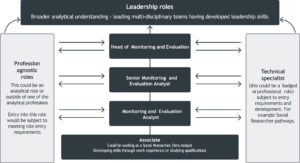Role profile: monitoring and evaluation analyst
Monitoring and evaluation analysts play an important role in establishing methods to monitor and evaluate varied policies or programmes. They often working in evaluation teams or as evaluation leads in wider multi-disciplinary divisions.
Monitoring and evaluation analysts have research skills and experience. This includes skills and experience in:
- quantitative and qualitative research design
- data collection
- analysis
- synthesis
- reporting
They could work in an analytical role, or be a member of an analytical profession.
Typical role responsibilities
Monitoring and evaluation analysts:
- produce high quality, innovative, and effective evaluation – this increases understanding of how policies are working, the effect they are having, and helps identify what can be improved
- develop evaluation frameworks
- use analytical skills to contribute to evaluation process – this includes preparing data for analysis, and activities like testing for data accuracy
- provide technical guidance and support to improve the quality and standard of evaluations
- encourage innovative methods and approaches in evaluations – this helps to improve the use and influence of evaluations
- help stakeholders to translate evidence, monitoring, and evaluation results into practical actions
- lead, manage, and produce evaluations
- quality assure evaluations
- communicate and share monitoring and evaluation findings, knowledge, and expertise
- follow the Analysis Function standards, as set out in the Aqua book and the Magenta book
Skills
There are several important skills that monitoring and evaluation analysts need to be successful in their role.
Find out more about skill level definitions.
You must be able to design tailored monitoring and evaluation plans and reviews by applying a range of different approaches and methods for data collection and analysis.
You will be expected to demonstrate these skills at different levels depending on the seniority of your role.
Monitoring and evaluation analyst
As a monitoring and evaluation analyst, you must demonstrate an ‘practitioner’ skill level.
Senior monitoring and evaluation analyst
As a senior monitoring and evaluation analyst, you must demonstrate an ‘expert’ skill level.
Head of monitoring and evaluation
As head of monitoring and evaluation, you must demonstrate an ‘expert’ skill level.
You must be able to use your analytical skills to synthesise data and present accurate results and recommendations. These results and recommendations will be used to support strategic decision-making on evaluation or programme design. You must also be able to test the accuracy of data.
You will be expected to demonstrate these skills at different levels depending on the seniority of your role.
Monitoring and evaluation analyst
As a monitoring and evaluation analyst, you must demonstrate an ‘practitioner’ skill level.
Senior monitoring and evaluation analyst
As a senior monitoring and evaluation analyst, you must demonstrate an ‘expert’ skill level.
Head of monitoring and evaluation
As head of monitoring and evaluation, you must demonstrate an ‘expert’ skill level.
You must understand the process of commissioning, designing and managing evaluations. You must have relevant analytical and research experience.
You will be expected to demonstrate these skills at different levels depending on the seniority of your role.
Monitoring and evaluation analyst
As a monitoring and evaluation analyst, you must demonstrate an ‘practitioner’ skill level.
Senior monitoring and evaluation analyst
As a senior monitoring and evaluation analyst, you must demonstrate an ‘expert’ skill level.
Head of monitoring and evaluation
As head of monitoring and evaluation, you must demonstrate an ‘expert’ skill level.
You must be able to communicate complex technical monitoring, evaluation and research concepts in ways that non-experts can understand. You must also be able to synthesise findings, and share learning from monitoring and evaluation to understand and apply your findings.
You will be expected to demonstrate these skills at different levels depending on the seniority of your role.
Monitoring and evaluation analyst
As a monitoring and evaluation analyst, you must demonstrate a ‘working’ skill level.
Senior monitoring and evaluation analyst
As a senior monitoring and evaluation analyst, you must demonstrate a ‘practitioner’ skill level.
Head of monitoring and evaluation
As head of monitoring and evaluation, you must demonstrate an ‘expert’ skill level.
Sample career path
The monitoring and evaluation analyst career path shows some of the common entry and exit points for the role. It also shows the typical skill levels needed.
You can enter a monitoring and evaluation analyst role from another analytical profession or other professions, such as the Government Social Research (GSR) profession or the policy profession. You can also exit the role to join another profession.

The diagram shows a potential career path. It shows that you can enter or leave a role from a wide range of backgrounds and experience levels. For example, you could become a monitoring and evaluation analyst by developing your skills in an associate role. You could continue to move up the levels in the career path by taking on more senior monitoring and evaluation analyst roles. Or you could develop your skills by working in a technical specialist role in an analytical or digital profession. You could also develop the necessary skills by working in a profession agnostic role outside of these professions.
A role that could be done by any person with the relevant skills or experience from any profession.
This could be a ‘badged’ or professional role that is subject to entry requirements and development.
Beyond the head of monitoring and evaluation role, you could go into more senior leadership roles. These roles require broader analytical understanding, and the ability to lead multi-disciplinary teams.
